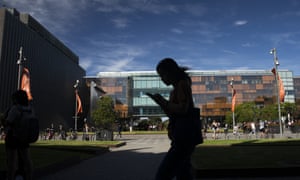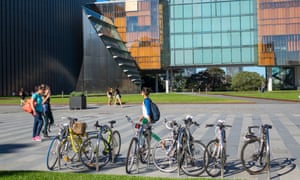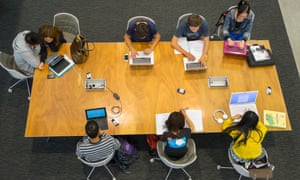‘We feel abandoned’: international students in Australia facing coronavirus alone
Hundreds of thousands of students at the country’s universities are stranded with no safety net in the middle of a pandemic

“I work hard, I do my best, but I still feel defeated by this unknown enemy. I just find myself crying at night thinking what will happen to me if this doesn’t end soon.”
Alexis (not her real name) arrived in Melbourne from the Philippines in 2019.
But the chaos and caprice of the Covid-19 pandemic has shattered those dreams: it has left her without an education to aspire to or employment to sustain her, and stranded in a foreign country without hope.

‘We can’t support you’
“I lost my job, the school doesn’t want to support us or to discount or freeze our fees and the other bills are still coming in,” she tells the Guardian. “And there is not even any moral support from the government because they think … ‘we can’t support you’. We understand that their priority is Australian citizens but we feel we are alone in this fight.”
With her income cut off and her limited savings steadily eroding, Alexis says she cannot afford to buy food or other essentials, or to pay the bills still steadily mounting. She cannot afford a flight home and even if she could, there are no flights to the Philippines she can take.
Alexis has a roof over her head, for now, but says without the Filipino diaspora’s bayanihan – a Tagalog word that roughly translates as a spirit of communal solidarity – assisting her in Australia, she would be left destitute.
“I want to thank my Titos and Titas in each organisation in helping us with food and shelter. They gave us light in this darkness and hope and faith that this will eventually pass … we stay strong together.”
Her financial precarity keeps her awake at night, but Alexis says it is the repeated and public incidents of racism linked to Covid-19 that have shaken her faith in the country that once welcomed her.
“I feel so inhuman in the way some Australians treat an Asian international student like me.
“When I was on the train and I was wearing a mask for precaution, a man shouted at me telling me I’m an idiot and stupid and because I’m Asian I brought the virus into this country. He said he wanted to hit me. I felt so hopeless, I just bowed my head and got off the train.”
‘Had to draw the line somewhere’
In constructing the massive $130bn stimulus package to save the nation’s economy and as many jobs as possible, the government makes the argument that “we had to draw the line somewhere”, and that that meant excluding people in Australia on temporary visas.

“This is a massive call on the public purse and it is a debt that the country will pay for years to come, and at six million people on the jobkeeper program, that’s nearly half the Australian workforce,” the treasurer, Josh Frydenberg, argued.
“Add an extra million onto the jobkeeper program, that’s an extra $18bn. We had to draw the line somewhere and I think the Australian people understand how generous, how significant this package is.”
The government has also argued that those who are not citizens of Australia should “go home” during this pandemic.
“If you are a visitor in this country, it is time … to make your way home,” the prime minister, Scott Morrison, said. “Our focus and our priority is on supporting Australians and Australian residents with the economic supports that are available.”
For many, going home is not feasible – they have built lives and families and communities here. And for others it is simply not possible. There is no way home.
Some countries have shut their borders to all entrants – citizens included – or there are no flights that can get them home, or transit countries such as Singapore have shut their borders to travellers.
There are hundreds of thousands in Australia right now stranded with no safety net, and no prospect of government intervention.
Even before the Covid-19 pandemic, they were, in many cases, among Australia’s most vulnerable people. They worked often in precarious employment in the gig economy, at risk of exploitation, under-payment and dangerous work practices.
They find themselves now stranded in a foreign country, without the social capital of citizenship, or its legal protections. They are without the fallback of family, or the assistance of a lifetime of networks and friendships built up.
In many cases, they are entirely alone.
A sense of security
Shubham Baid is in the second semester of a master’s degree at the University of New South Wales.
A councillor on the university’s postgraduate council, he says his phone nows rings constantly – 15 to 20 calls a day – from international students worried about their courses or capacity to survive and stay in Australia.

Baid said students were concerned about being forced to pay full-rate student and course fees, when courses were now running online instead of being delivered in person, and worried they could get caught in breach of their visa conditions by travel restrictions.
“I can totally understand a country would first look after its citizens,” Baid says, “but I think there needs to be some consideration, some provision for international students. International education brings an enormous amount, $39bn, into the Australian economy. And we are part of this community. We work and study here, we pay taxes, we live in the Australian community, but right now, we feel very disconnected, we feel isolated.”
Some initiatives, Baid argues, would cost the government little, if anything, such as automatic visa extensions for students whose studies have been interrupted. Baid says he and fellow councillors are preparing a survey of students, gauging their experiences during the Covid-19 pandemic.
“If the government cannot be sympathetic it becomes difficult to cope, the future becomes blurred for the students, and it is another great stress on top of the stress that everyone is already feeling during this crisis. We don’t know what our futures will be.
“We need to know we will be looked after in this country, that sense of security that everyone longs for, especially at a time like this.”
A moral imperative
Reyvi Marinas is a member of Migrante Australia, a community and advocacy group for the Filipino diaspora, which has begun providing donated groceries, counselling and legal advice for students left destitute.
Some students, he says, come to Migrante’s doors distraught, having been harassed by debt collectors for student fees they simply can’t pay.
Marinas argues international students are a vital part of Australia, not just of its economy but the fabric of its communities as well, and says they feel “abandoned” by the government in the face of this crisis. There is a moral imperative to help those in the community left vulnerable to the vicissitudes of the crisis, he says.
“Australia has encouraged these students to come to Australia … but in times of need, these students’ contribution has been completely ignored and wilfully disregarded by this government. Many of these students have contributed immensely to the social, cultural and economic fabric of Australian society, many are taxpayers like the rest of Australian citizens and permanent residents in this country.”
He says many Filipino students face no choice but to find a way to survive in Australia. There are no flights home, and no way of getting across the Philippine archipelago even if they could find a flight.
“People are really suffering, and they feel abandoned, they feel they are alone in this.”
Since you’re here…
… we have a small favour to ask. More people, like you, are reading and supporting the Guardian’s independent, investigative journalism than ever before. And unlike many news organisations, we made the choice to keep our reporting open for all, regardless of where they live or what they can afford to pay.
The Guardian will engage with the most critical issues of our time – from the escalating climate catastrophe to widespread inequality to the influence of big tech on our lives. At a time when factual information is a necessity, we believe that each of us, around the world, deserves access to accurate reporting with integrity at its heart.
Our editorial independence means we set our own agenda and voice our own opinions. Guardian journalism is free from commercial and political bias and not influenced by billionaire owners or shareholders. This means we can give a voice to those less heard, explore where others turn away, and rigorously challenge those in power.




